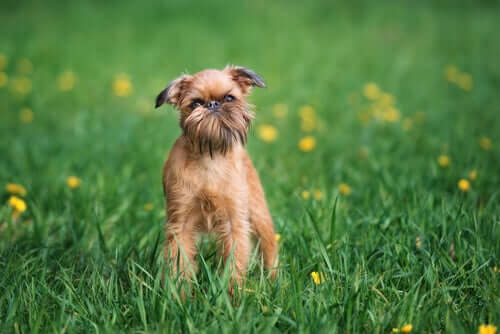The Brussels Griffon: Small but with Plenty of Character

This breed belongs to the group of miniature dogs. It got its name because it originated in the capital of Belgium. In the following article, we’ll tell you everything about the Brussels Griffon, a dog breed with a beautiful flat face and large head proportionate to its body.
Origins and characteristics of the Brussels Griffon
Its “official” name is Griffon Bruxellois. As we mentioned above, it originated in the capital of Belgium, along with two other breeds: the Griffon Belge and the Petit Brabançon. All three have common ancestors. Moreover, in many cases, people think they’re actually the same breed. The only differences between them are the color of their fur.
In the past, the Brussels Griffon hunted rats, and, despite its small size, it also guarded homes. This companion dog always belonged to the Belgian elite due to its cost and the perception people had of it.
The popularity of the Brussels Griffon grew rapidly in Belgium and across Europe. This happened after Queen Marie Henriette became interested in Griffons, which led her to become a breeder and promoter of this breed. Throughout the nineteenth century, it was bred with Pugs and King Charles Spaniels.
The two World Wars that ravaged the continent almost lead to the extinction of the Brussels Griffon. The good news is that many English breeders were able to rescue the breed. However, it never gained the same popularity as before.
Currently, the Brussels Griffon is chosen as a companion dog in cities due to its small size.
In terms of its appearance, it’s a small animal with a chubby body, small ears, bushy eyebrows, and a short tail. Its coat is reddish-blond, wavy, and rough. They can weigh 8 to 10 pounds. Their height varies between 9 and 11 inches.
Its big eyes, broad and flat nose, and prominent chin are some of the main physical characteristics of the Brussels Griffon. This dog moves gracefully, has a robust gait, and an almost square profile.
Temperament of the Brussels Griffon
In general, Griffons are very active, bold, and alert dogs that become very attached to one person (and accompany them all the time). Some Griffons may be somewhat nervous and suffer from anxiety when left alone. The Brussels Griffon is friendly, playful, and somewhat shy when it doesn’t know people.

It can be a bit difficult for Griffons to socialize with other dogs. In fact, it doesn’t get along with owners who want to dominate it. However, the key is to train Griffons from when they’re puppies to avoid any future problems.
In addition, the Brussels Griffon has a strong personality. For this reason, it isn’t recommended for people who can’t devote much attention to pets (or for those who are thinking about getting a dog for the first time), as they’ll need to be at their side at all times. It’s also not advisable for people who spend many hours away from home or for people who have children, because it can react badly to sudden movements or noises. If you’re not sure your children won’t treat the Brussels Griffon as a “doll”, then it’s not a good choice for your family.
Health
While it’s small and is adjusting to living in an apartment, it’s essential to take it for walks in parks or other spacious places. It needs to play, run, and exercise almost every day. Otherwise, it might make a habit of breaking furniture or other home objects.
The Brussels Griffon doesn’t suffer from specific breed-related health problems. It’s essential to pay careful attention to, and clean, their eyes periodically. Since Griffons have large, bulging eyes, they’re more prone to injury.
Finally, don’t forget to brush your Griffon’s coat two to three times a week and remove the dead fur every three months.